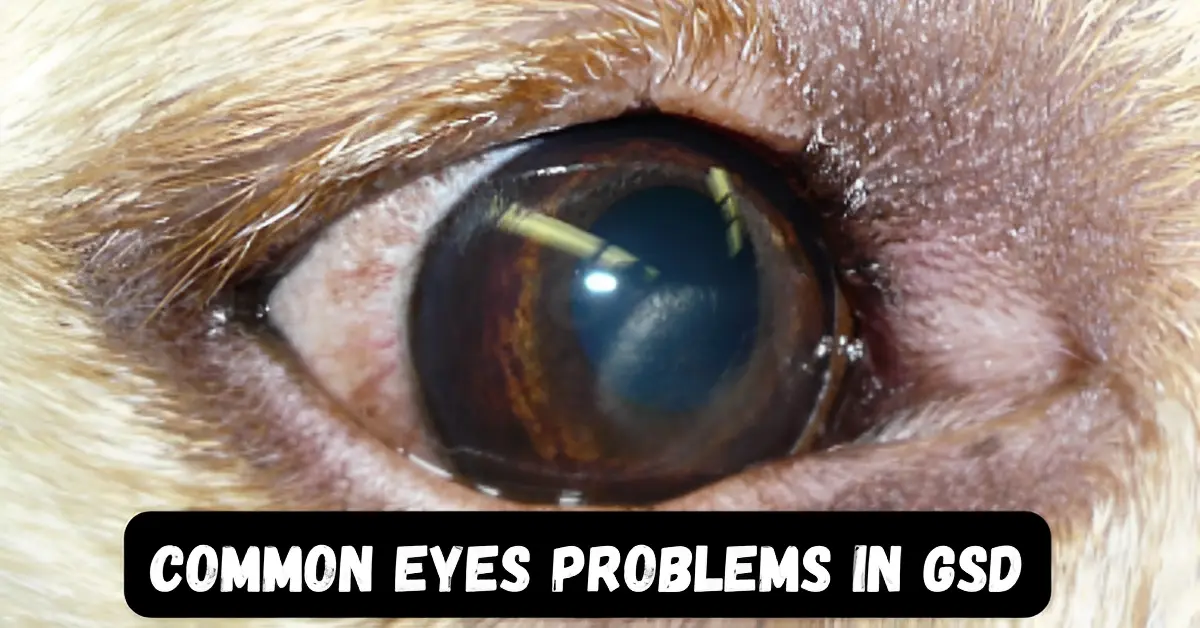German Shepherds are renowned because they are very loyal to humans and especially to kids. As these majestic creatures accompany us through life’s journey, it’s crucial to understand and address potential health concerns they might face, particularly when it comes to their eyes. A German Shepherd’s eyes are not only the windows to their souls but also vital tools for communication and interaction with the world around them. In this comprehensive guide, we will delve into the world of common eye problems that German Shepherds may encounter, offering insights into their causes, symptoms, and the best ways to ensure their eye health.
The Eyes: Windows to a German Shepherd’s World:
A German Shepherd’s eyes serve as more than just physical organs – they are conduits of emotion, connection, and understanding. These expressive eyes communicate joy, concern, curiosity, and love, forming a profound bond between these dogs and their human companions. Beyond their role in communication, a German Shepherd’s eyes are essential for their overall perception of the environment. Thus, proactive eye care is not just a responsibility but a gesture of compassion towards these loyal companions.
Common Eye Problems in German Shepherds:

Progressive Retinal Atrophy (PRA):
Progressive Retinal Atrophy (PRA) is a genetic condition that strikes fear into the hearts of German Shepherd owners due to its potential to cause gradual vision loss. PRA is characterized by the degeneration of retinal cells, leading to night blindness and a slow narrowing of the visual field. Over time, affected dogs may also experience dilation of pupils and increased sensitivity to light. While PRA has no cure, diligent management can significantly enhance the dog’s quality of life.
Cataracts:
Cataracts, common in both humans and dogs, can cloud a German Shepherd’s vision and impact their overall quality of life. These opaque areas that form in the lens of the eye can result from aging, genetics, or even diabetes. A German Shepherd’s vibrant gaze may turn cloudy, signaling the presence of cataracts. Fortunately, cataract removal surgery is a viable option, restoring clear vision and improving the dog’s overall well-being.
Cherry Eye:
Cherry eye, despite its whimsical name, is a condition that can be concerning for German Shepherd owners. It occurs when a tear gland in the dog’s third eyelid becomes prolapsed, creating a red and swollen appearance that resembles a cherry. While this condition isn’t typically painful, it can lead to discomfort and potential complications if left untreated. Identifying a cherry eye in your German Shepherd is crucial, and seeking prompt veterinary attention is recommended. In some cases, surgical intervention may be necessary to reposition the gland and restore normal function.
Glaucoma:
Glaucoma, a silent menace, poses a significant threat to a German Shepherd’s eyesight. This condition involves increased pressure within the eye, which can damage the optic nerve and result in vision loss. Glaucoma can manifest as acute or chronic, with symptoms including redness, squinting, and cloudiness in the eye. The urgency of seeking immediate veterinary care cannot be emphasized enough, as early intervention can help alleviate pain and preserve the dog’s remaining vision.
Entropion:
Entropion is a condition where a portion of the eyelid, usually the lower lid, rolls inward, causing the eyelashes to irritate the eye’s surface. German Shepherds with entropion may display signs of discomfort, including excessive tearing, redness, and discharge. Left unaddressed, this condition can lead to corneal ulcers and other complications. Fortunately, surgical correction can provide relief by restoring the eyelid to its proper position and preventing further discomfort.
Symptoms of Eye Problems in German Shepherds:
German Shepherds, with their captivating eyes and expressive faces, communicate a wealth of emotions. However, when those eyes show signs of discomfort or trouble, it’s essential to pay attention. Recognizing the symptoms of potential eye problems can help you seek timely veterinary care and ensure your furry friend’s visual health. Here are some common symptoms to watch out for
- Excessive Tearing (Epiphora)
- Redness and Irritation
- Cloudiness or Haze
- Squinting (Blepharospasm)
- Visible Third Eyelid (Nictitating Membrane)
- Changes in Behavior
- Discharge or Tearing Stains
- Pupil Abnormalities
- Visible Swelling or Lumps
Preventive Measures for Optimal Eye Health:

Regular Veterinary Check-ups:
Routine eye examinations are not just a luxury but a necessity when it comes to ensuring your GSD’s eye health. Regular visits to a trusted veterinarian allow for early detection of potential issues that might otherwise go unnoticed. These check-ups provide a comprehensive assessment of your dog’s eye health, ensuring that any signs of discomfort, irritation, or underlying problems are addressed promptly. Remember, catching eye problems early not only prevents unnecessary suffering but also promotes your furry friend’s overall well-being.
Nutrition and Supplements:
Maintaining a balanced diet is a cornerstone of holistic canine care, and it plays a pivotal role in promoting optimal eye health in German Shepherds. Just as certain foods benefit our own vision, our four-legged companions also require specific nutrients to support their ocular wellness. Omega-3 fatty acids, often found in fish oil, contribute to a healthy tear film and help combat dry eyes. Meanwhile, vitamin A is known to support retinal health and night vision. Consult your veterinarian to ensure that your dog’s diet is rich in these essential nutrients, or consider incorporating supplements if necessary.
Eye Hygiene:
Just like you wouldn’t neglect your own eye hygiene, it’s important to pay attention to your GSD’s eye cleanliness. Dust, debris, and irritants can accumulate around their eyes, potentially leading to infections or discomfort. Gently clean the area around their eyes using a damp, soft cloth. If your dog tends to have tear staining, consider using a specialized tear stain remover. By incorporating eye hygiene into your regular grooming routine, you’re taking proactive steps to prevent potential eye issues.
UV Protection:
As the sun’s rays can have damaging effects on human eyes, they can also impact your German Shepherd’s eyes, particularly in sunny environments. Just as you might don sunglasses on a bright day, consider investing in doggy sunglasses for your furry friend. These protective shades shield their eyes from harmful ultraviolet (UV) radiation, reducing the risk of conditions like photokeratitis and promoting long-term eye health. Whether it’s a leisurely walk or an energetic play session, your German Shepherd will thank you for the extra layer of protection.
Conclusion
In the world of German Shepherds, their eyes are not just captivating features but also vital tools that allow them to experience life to the fullest. As dedicated guardians of these remarkable companions, it’s our duty to ensure their well-being, and this begins with their eye health. By understanding the common eye problems that German Shepherds may encounter, implementing preventive measures, and seeking prompt veterinary care, we can help safeguard their vision and enhance their quality of life.
FAQs
Can eye problems in German Shepherds be prevented through breeding selection?
Responsible breeding practices are crucial in reducing the likelihood of passing on hereditary eye conditions. Genetic testing and thorough screening of breeding dogs can help mitigate the risk of passing on predispositions to eye problems.
Are all eye problems in German Shepherds hereditary?
While some eye problems in German Shepherds are indeed hereditary, others can result from a combination of genetic factors, age-related changes, and environmental influences. Regular check-ups can help differentiate between these factors.
How often should I take my German Shepherd for an eye check-up?
It’s recommended to schedule annual eye examinations for your German Shepherd, even if they show no apparent signs of eye problems. Regular check-ups enable early detection and proactive management of potential issues.
Can I use human eye drops for my German Shepherd’s eye irritation?
It’s essential to consult a veterinarian before administering any medications, including eye drops, to your German Shepherd. Human medications may not be suitable and could potentially worsen the condition.
What are the early signs of an impending eye problem in my German Shepherd?
Keep an eye out for signs such as excessive tearing, redness, squinting, cloudiness, or changes in behavior related to their eyes. Recognizing these signs early allows for swift veterinary intervention.
Is surgery the only solution for most German Shepherd eye conditions?
Surgery might be the most effective solution for certain eye conditions, especially those that pose a risk to the dog’s vision and comfort. However, not all problems require surgery – some can be managed with medications, lifestyle adjustments, or other non-invasive treatments.

